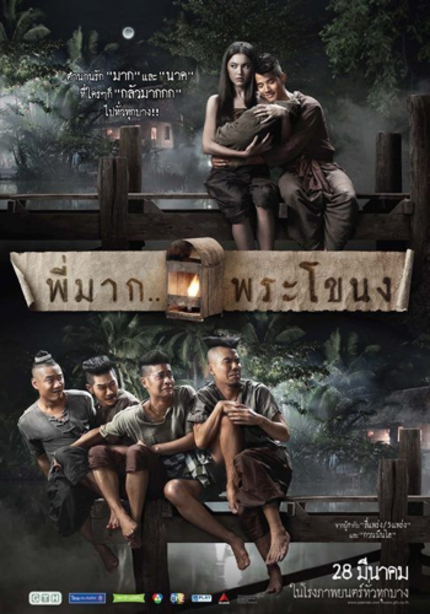Review: PEE MAK PHRAKANONG is a Thai Horror Comedy Deserving of its Success

Re-inventing a classic Thai ghost story into a goofball comedy romance, seasoned director Banjong Pisanthanakun has scored a huge box office hit in his native Thailand. While unlikely to do the same kind of business outside South East Asia, Pee Mak Phrakanong is nevertheless an enjoyable and frequently laugh-out-loud crowd pleaser.
Easily the most famous and successful horror filmmaker to emerge from Thailand in recent years, Banjong Pisanthanakun has scored a number of critical and commercial successes on the international stage with films such as Shutter and Alone. He recently directed a segment of Ant Timpson and Tim League's horror anthology The ABCs of Death (N is for Nuptials) and has now delivered the most successful Thai film of all time at the domestic box office.
Pee Mak Phrakanong (or simply Pee Mak) is a playful, often anachronistic retelling of the famous Thai ghost story, Mae Nak Phra Kanong (Lady Nak of Phra Kanong). Set roughly 100 years ago, during the turbulent Rattanakosin Kingdom era, a young man, Mak (Mario Maurer), is sent off to war, leaving behind his beautiful pregnant wife, Nak (Davika Hoorne). While Mak is away fighting, Nak and her baby die during childbirth. Mak is wounded but vows to make it home alive. On his return, Mak discovers his wife and child waiting for him, and he refuses to listen to the villagers who try to inform him he is living with a ghost.
In this regard, this new version of the story is true to its classical roots, however Pisanthanakun's take on the story differs by the inclusion of Mak's four wise-cracking war buddies. Anyone who has seen Thai horror anthologies 4bia or its sequel should instantly recognise Ter, Aey, Shin and Puak - the four best friends from each of Pisanthanakun's segments. And here they are again, first introduced on the battlefield alongside Mak, only to accompany him home and take up residence in the house next door.
As one may have gathered by now, it is from these four characters that much of the film's humour arises. Early on after their return to Phra Kanong village, Mak's friends begin to suspect that all is not what it appears, and when they discover a decomposing corpse buried behind the house, they are convinced that Nak is in fact a ghost and that their friend is in danger - and that they are too!
While nominally set around a century ago, everything about these four characters, from their hairstyles to their modern language and continual pop culture references, is aimed squarely at today's audiences. A rousing pre-battle speech cites films like The Last Samurai and 300, while later they take potshots at co-star Maurer's earlier box office failures. It all sounds like a terrible idea on paper, but for the most part it really works.
Pee Mak looks and sounds nop-notch, with excellent production values and a great-looking cast. The stunning Davika Hoorne makes for an excellent central antagonist, treading that fine line, being beautiful, alluring and creepy all at once, even if she's not asked to do a great deal more than look gorgeous and throw menacing glances at her loudmouthed co-stars.
International audiences may well struggle with Mario Maurer's performance, however, as he often comes across as annoyingly submissive, wet and clingy. Mak fails to notice anything wrong with his wife because he is so utterly besotted by her, but his constant pining and cooing start to grate after a while. The actor has done better work in the past, notably as the monk at the centre of The Outrage, the recent Thai language remake of Rashomon, but here he struggles to make us care for his bland hero.
Almost all of the film's laughs come from Nattapong Chartpong, Pongsatorn Jongwilak, Wiwat Kongrasri and Kantapat Permpoonpatcharasuk as Pisanthanakun's foursome of likely lads. The bulk of the film's 115-minute runtime is spent following them as they run, scream, fall, cower and pratfall their way through the movie, trying in vain to warn their friend of his supernatural predicament. The film repeatedly plays with audience preconceptions, teasing us with the possibility that one or more characters may also be dead already. In the film's opening scenes, Mak and his friends are all shot at and seriously wounded, before swearing they will make it home not matter what. Exactly who has accomplished that task successfully is played with throughout the film, feeding the foursome with plenty of opportunities to accuse, suspect, run away from and even turn on each other in their desperate efforts to survive.
And here we get to the film's central problem. There is only so much running, screaming and otherwise hysterical behaviour we can put up with, without significantly carrying the narrative forward. For a large part of its second half, the film feels like its treading water and repeating itself. Admittedly, it does regain traction for an entertaining finale in a Buddhist temple, but the film would certainly benefit from more judicious editing and perhaps losing around 20 minutes from its running time.
That said, after enduring a number of recent Thai horror films without much gratification for my trouble, Pee Mak makes for a refreshing and enjoyable experience. It is never scary, but it is frequently laugh-out-loud funny and populated by characters who for the most part, we actually care about. The film is quintessentially Thai, riffing on historically significant cultural touchpoints, while shooting squarely for a modern, contemporary crowd pleaser and hitting its mark dead on. If you want a perfect signifier for where Thailand's film industry is at right now, Pee Mak Phrakanong is it.

Do you feel this content is inappropriate or infringes upon your rights? Click here to report it, or see our DMCA policy.






